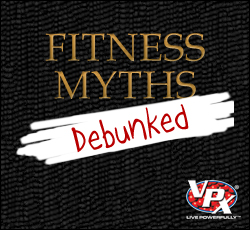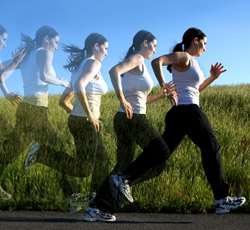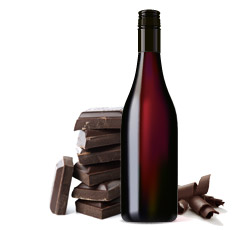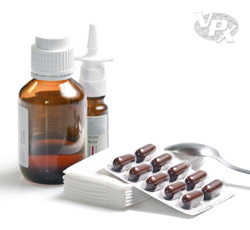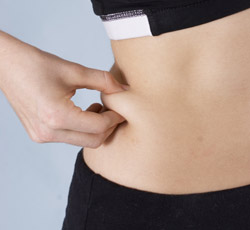-
Eating fat leads to getting fat.
When you hear the word fat, do you associate it with bad health? If you do, then you decided to take a left at the fork in the road when you should have veered right. Let’s retrace our steps and discover why fats should be associated with good health. Although there is some truth to your thought process, some fats are needed for optimal health. Here is some science about the good in fats.
Fats, which tend to be widely overlooked, help with nutrient absorption (vitamins such as A, D, E, and K), nerve transmission, and maintaining cell membrane integrity. They provide raw materials for synthesis of many compounds and are crucial for providing EFA (essential fatty acids) that the body cannot produce on its own. These fats provide the body with energy during endurance exercise, in between meals, and in times of starvation. This energy is insulin-free energy, which means your get the long lasting surge of energy without the crash! Furthermore, they are the indispensable constituent of cell membranes. You have to understand that the body needs a supply of polyunsaturated fats to assist in assembling cell membranes that are strong, functional and elastic. Fat also provides a great service by keeping hormone levels in check and regulates blood-glucose levels and insulin response. Unsaturated fats (good fats) decrease the risk of heart disease. Monounsaturated fats and polyunsaturated fats lower total cholesterol as wells as LDL cholesterol (the bad cholesterol), while increasing HDL cholesterol (the good cholesterol). These fats are mainly found in vegetable oils, salad dressings and various margarines made from vegetable oils. They can be found in avocadoes, various seeds and nuts, as well as in fish such as salmon. Another good fat that’s commonly associated with fish, are the Omega 3/6/9 fatty acids. The Omega’s play an important role in improving mood, vision, skin, recovery, immune system function, and joint health. -
NO DAYS OFF BRO!
Ok, just like our mind needs rest with sleep, our body needs rest after being worked. Taking some intermediate time off after a 2 month overhaul is a good idea so you don’t become over-trained. Also, those 1-2 days off during the week is great to help your workout split so you’re not over-training particular muscle groups. See, a workout is a catabolic activity used to stimulate growth. This is because anabolism (growth) is stimulated by catabolism (breakdown). This “negative-feedback loop” is the body’s way of saying “We need to grow to push more weight.” From there, the body goes to work repairing, compensating, and then overcompensating for the damage done. This leads to the Peak Overcompensation Point, or POP. POP is the period of time where your muscles have fully recovered and can be trained again. If one waits too long after the POP, the muscles will start to atrophy, whereas if one doesn’t wait long enough for the muscle to fully recover then the muscle becomes overworked. To find the right time to train the muscle again, you can wait until the soreness has gone and feel it out that way, or you can lift the muscle group again and see if you are able to push more weight then you did the previous workout. If more weight can be pushed, you’ve found your time period for that particular muscle group. If you are weaker or just about the same, try adding another rest day or two to the previous amount of rest days. The process of recovery and growth starts to kick in after the workout! -
If women lift heavy, or like men, they will get bulky.
This is a classic myth that needed to be put in here. Women like to use the excuse of, “If you choose to lift heavy you will get bulky.” That’s a bunch of BS, and is used on a daily basis so people can stay in their comfort zone! First, a body full of lean muscle tissue is sculpted out of hard resistance training. Hitting 1 set of 50 reps with 10lb dumbbells is a waste of time. Push yourself out of the comfort zone and train with 110% intensity with weights that cause a strain and recruit the most muscle fibers for optimal growth. Second, women do not have the amount of testosterone running through their veins to produce that bulky look like men do. So hit the weights ladies; a lean body is a sexy body. -
Drastically cutting caloric intake to shred up for the summer.
Calorie reduction is a great way to rev-up the fat loss process, but the problem lies in how many calories to reduce at once. Many people want the quick fix so they will drastically cut their calories to see quick results. This drastic reduction in calories not only makes you feel lethargic since there is less fuel to provide energy, but it sets a starvation response in motion. The body sees it as being “in-danger” and on the verge of starving, so it will hold on to fat to be used as a backup plan. It will also slow down your metabolism as it realizes that it shouldn’t waste so much energy on daily requirements, “just in case.” This, in turn, will actually burn lean muscle tissue! This loss in muscle tissue will degrade the metabolism even further. Lean muscle tissue is very metabolic which means the more muscle you have on your body the more metabolically active your body becomes and the more calories are burned per day. This is why lean people tend to stay lean a lot easier then someone who isn’t as lean. When you lose this lean muscle tissue, your body doesn’t need to keep feeding that tissue anymore so the body slows down its metabolism and this degradation of the metabolism increases your overall body fat percentage. So the trick is to stimulate the body to burn fat without setting off an alarm. A small cut in calories will help you stay energetic (giving you the energy to still kill it in the gym) and keep your metabolism revved up. A reduction at about 10% of your daily caloric intake should start the fat loss process in motion. -
Creatine just bloats you muscles with water and you lose all gains when you stop.
Ok this is one of my favorites! Creatine is subjected to the false reputation of only flooding your cells with water and causing a bloated look which will eventually fade after a discontinued use. Well that effect alone is a good effect, because a hydrated muscle is a healthy muscle. But the effect creatine has in the body supersedes more than just the cell volumizing/hydrating effects. Creatine promotes greater gains in lean body mass as well as increasing the bodies muscle hypertrophy. It has been shown to improve performance in endurance and strength as well as overall maximum effort output. It is also said that with use, athletes will experience an increase in the levels of mRNA for IGF-1 and IGF-2. The net result with the use of creatine is to fuel faster gains in strength and muscle mass. The greater the amount of creatine in a diet will result in a greater amount of phosphocreatine stored in your muscle tissue. So what the hell is phosphocreatine, and what does it have to do with the use of creatine? In your body, Phosphocreatine (PCr) is stored through the combination of creatine and phosphate. This PCr is stored in your muscle tissue along with your ATP. Together PCr and ATP store the chemical energy of the body, and the more energy they store the greater the output of maximal muscle performance. So when you’re working out, your body uses ATP and converts it to ADP by cleaving off a phosphate group (STAY WITH ME). What PCr does is donates a phosphate group to ADP to regenerate it back to ATP which = ENERGY! It is important to take a creatine supplement and maintain this higher than normal amount of creatine in your body. By adding creatine, it will help maintain increased levels of creatine phosphate in your muscle tissue. Now, with a greater amount of creatine phosphate available, the easier it is to replenish your ATP. In a nutshell, the addition of a creatine supplement results in loading up your muscle fibers with PCr. This gives your muscles the ability to work harder and store more power in the form of PCr. -
Carbs are EVIL!
Ok, carbohydrates are not evil. They are our main source of energy and are required for a lean muscular body. If you rid your diet of carbohydrates, this means you are not fueling your body properly and put your muscle tissue at risk to be used as fuel. The body will actually tap into the muscle cells to break down amino acids for fuel (this is called gluconeogenesis). Now, all carbohydrates, whether simple or complex, break down into a sugar called glucose. Glucose stimulates the release of insulin which is the body’s fat storage hormone. Insulin is known to be a double-edged sword, as it can add lean mass or store a bunch of fat. If you’re wise about which carb source you choose, and the particular time of day to consume that carb you can benefit from insulin spikes, as they will store carbohydrates into the depleted muscles/liver instead of in fat cells. Carbs need to be ingested in moderation! If you choose to eat a large plate of pasta, you will cause a large release of insulin into the blood stream, which will store glycogen into the muscle and then into fat storage sites. The more insulin in your blood stream, the more of a chance you have to store glucose in fat cells. A smaller plate of pasta will cause a smaller spike in insulin, thus reducing the chances of being stored in fat cells. When your body can store the glucose in your muscle cells, the glucose becomes readily available in between meals if blood glucose levels fall below normal.
So now the question lies in which carb to choose? Simple carbs break down easily which will cause a quick spike in insulin to where complex carbs take longer to break down (they consist of multiple chains of simple sugars, which means more time needed to break apart) which will cause a smaller insulin response. With insulin levels on the lower side, as opposed to elevated, the body is more prone to burn fat as fuel and store glucose from carbohydrates foods as muscle glycogen. So this means choosing more complex carbs will give you less of chance to store body fat through the response of insulin. Simple carbs have their place, especially post workout! The large spike in insulin will force the carbohydrates and protein (PWO SHAKE) into muscle cells since they are depleted from an intense workout. You can add simple carbs into your diet as long as your smart about how much to consume, when to consume it, and to consume it with fiber (as fiber slows down the digestion of carbs), and a protein which when broken down will release glucagon (glucagon is a hormone that opposes insulin and drags insulin levels down). -
I have to do a lot of cardio to be lean.
Cardio is a great way to burn some calories and is needed in the fat loss process, but at a MINIMUM. Cardio is an aerobic exercise that reduces body fat as well as muscle mass. Remember, when you lose muscle mass, your natural Basal Metabolic Rate slows down, and in turn fewer calories are burned per day. Your lean body mass is directly correlated with how many calories you use up each day and how lean you can ultimately become. Cardio is a stress put on the body, and our bodies adapt to stress. So when you do 20 min of cardio for 3 weeks, the body will slowly start to adapt to that stress and you don’t get the same effect as you did when you were just starting off. When you perform cardio daily, your body will adapt to reserve as much energy as possible and the only thing to do is to add more cardio right? Wrong! This process will continue until you’re doing an hour or more of cardio per day and still staying the same body fat percentage. Why does this happen? It’s the same reason as talked about before with drastic cuts in calories. As your body adapts to reserve calories it downgrades your metabolism. If you like to run for hours on end here is the energy adaption response to cardio: The body over time will adapt and become more fuel efficient. It will learn to burn the fewest amount of calories possible in an attempt to be successful (success being run farther and longer all on fewer calories). With long distance running, fat is the major source of energy so your body will become extremely good on figuring out how to become REALLY good at storing and holding onto body fat. Now if you stop you may say “Hey doesn’t this mean I will be burning less calories per day then and gain fat?” The answer is no, your body will have already downgraded your metabolism so its burning fewer calories per day then you think. The only way to get your metabolism back is to feed your body and cut cardio out until you get your baseline diet in order. Once in order, you can manipulate foods to help you lose weight and implement an effective training schedule that will add lean muscle to your body. The main way to get lean is to incorporate a hard resistant training program. This will help build lean muscle tissue, therefore increasing you metabolism!
This is a guest post by VPX Team Athlete Vincent Russo. You can follow him on Instagram @vrusso10.

